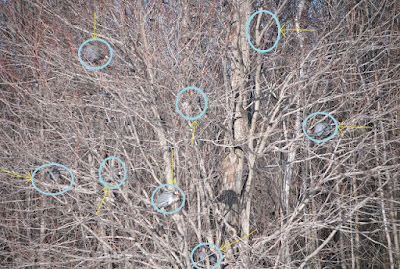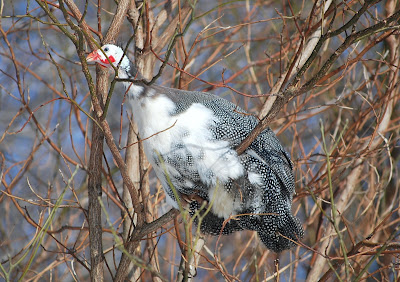This brings me to a seldom discussed feature of the African guinea hen. I'm talking about the reason guinea fowl have spots. I mean sure, they're pretty....but WHY do both male and female guineas have the exact same color pattern?
Why Guinea fowl have spots
For camouflage of course! Picture the dry African plains where guinea hens originally roamed, then look at these pictures of the tree. The dry vegetation makes a perfect cover for this dimwitted fowl to hide in!
If you have guineas you understand that nature just knew a guinea hen would not be smart enough to hide, so nature brought the hiding space to guinea by making them blend in naturally!
Can you guess how many Guineas are in that tree? 8! Click the picture to make it larger.
Guinea fowl have very unique feather coloring. Each guinea feather has tiny white dots on a dark grey background. While these feathers are striking up close, from far away they make perfect camouflage.
It's a little odd that the male guinea cock and the female guinea hen have the exact same feather pattern. Normally males are more vibrant than females in the poultry world, but I guess since their feather coloring matches the landscape so perfectly any differences might have made them stand out more.
There was one guinea hen who decided to perch in a bush below. Another Pied guinea was in the next tree. Mostly though, they all congregated in that one tree. They had acres of trees and they all were in the same one, think about that for a second.
I'm not sure if perching together like that is stupid because they're all in one place, or brilliant because they can scatter from a predator and perhaps all get away? Guineas aren't terribly smart so it's probably the former!
Lilac and one other guinea were hanging out in the coop with the same "I am NOT standing in that white stuff!" look on their faces! I guess even though guinea fowl are cold hardy they don't really prefer the snow!
We're in for a surprise warm up this week, so hopefully they will enjoy their few days of sunshine and warmth before the cold sets in again!
If you have any other questions about raising guinea fowl you might find the answers here: Guinea Fowl 101 or feel free to leave a question down below and I will answer it as best I can!
~L
Related reading: 7 Things you didn't know about Guinea fowl.
Want information on raising chickens sent right to your email weekly? Click right here to join my list and get new posts sent directly to you the day they're published. You'll also get the free download 25 Ways to save money raising chickens.





we bought 3 keets and were told that they were all females. Yeah right! Now I have one female and 2 males! Im gong to rehome one male (a totally grey one) and keep one, a white. I think they will be happy together and Im planning on hatching some keets (although I have never seen Guinea girl get caught yet Im hopeful that some of the eggs will hatch. Itll be the first time trying so.....
ReplyDeleteAs far as I know there is no way to tell the sex of a guinea keet before they are old enough to make their calls. Usually 4 weeks or more. Sorry someone did that to you! I don't often see the guinea fowl mate, but I get all fertile eggs. I think they're more discreet than chickens! lol Good luck with them!
DeleteLisa
We have guinea eggs in an incubator...but as we are finding new eggs every day, they are going into the incubator on different days. This means that they will be hatching at different times. How can we manage this?
ReplyDeleteYou can collect eggs for up to 10 days without them losing viability. I would collect eggs for at least a week before putting them into the incubator. That way you have concentrated hatches instead of a different egg every day. Hope that helps!
DeleteLisa